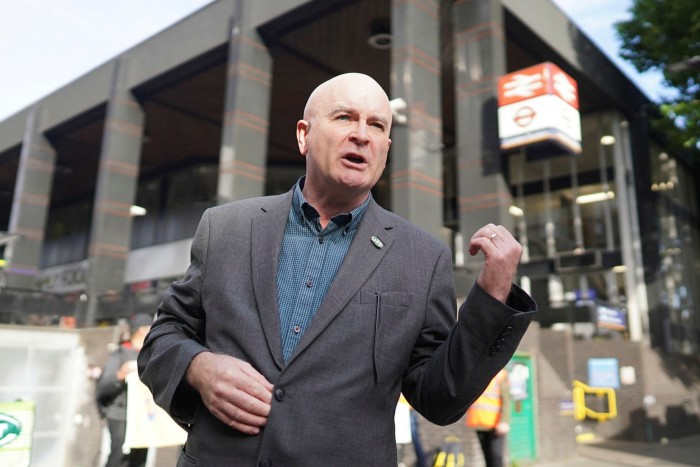UK rail strike begins as days of disruption loom
Large pieces of Britain have ground to a halt in the most important strike to strike the country’s railways in 30 many years, as Boris Johnson known as for pay restraint to rein in mounting inflation.
Rail passengers across the place have been forced to stay at residence after warnings to keep away from all but crucial travel, with only a single-fifth of mainline trains expected to operate and many lines shut totally.
With only skeleton services jogging for commuters into London and other metropolitan areas, there were being no trains on substantial sections of the network in the course of early morning rush hour.
Customers of the RMT union have walked out in a dispute around pay, operating tactics and achievable redundancies, such as 40,000 personnel at infrastructure proprietor Community Rail and team at 13 practice functioning firms. Much more strikes are planned for Thursday and Saturday. London Underground staff also went on strike for just one day on Tuesday.
The RMT management is pushing for fork out rises of 7 to 8 per cent to compensate for inflation envisioned to hit 11 for every cent this year. But Johnson and Chancellor Rishi Sunak system to say at a cupboard assembly on Tuesday that pay self-control and restraint are important to handling inflationary pressures downwards.
“It is ideal that we reward our hard-doing the job general public sector workers with a shell out rise, but this desires to be proportionate and well balanced,” the Uk prime minister is because of to say. “Sustained better ranges of inflation would have a much even larger effect on people’s shell out packets in the very long run.”
Johnson will argue that the strikes are “driving away commuters who ultimately help the employment of rail workers”.

There is uncertainty more than when official negotiations on ending the strike will resume. Community Rail hopes to restart talks on Wednesday and its main negotiator visited an RMT picket line on Tuesday morning, but the union mentioned even though it was open to talks, it experienced not formally acquired an invitation.
Mick Lynch, head of the rail union, has claimed the RMT “has no selection but to protect our users.” He blamed the authorities for “shackling” the rail industry’s pay out delivers and utilizing the pandemic as an excuse to impose “transport austerity”, which includes closing all ticket places of work.
Train drivers are customers of a diverse union and are not on strike, while the business has drafted professionals and other staff on to the frontline to do the job on platforms and in signal containers.
The railway will close down by 6.30pm, with the previous trains concerning London and metropolitan areas this sort of as Birmingham, Manchester, Leeds and Edinburgh all departing before 4pm.
The disruption is possible to persist on the days concerning the official strikes, notably in the morning, due to the fact trains will be out of place for their timetabled operates.
Andrew Haines, Community Rail’s chief government, explained he was “profoundly sorry” to travellers for the disruption but blamed the RMT for refusing to compromise which include on “archaic” doing work tactics.

He explained Network Rail had penned to the RMT threatening “less than 2,000” redundancies, but that he hoped these could be voluntary.
Haines additional that ministers have agreed Community Rail could go further than the public sector spend cap and offer you a rise of additional than 3 per cent since of the huge scope for efficiency gains within just the field.
Whilst the governing administration has refused to directly negotiate with the RMT, in outcome ministers command the industry’s finances.
Community Rail is condition-owned, though the Section for Transportation sets once-a-year budgets for the solutions run by private teach functioning organizations less than coronavirus pandemic-period modifications.
Business leaders warned that the strikes would strike the sectors most difficult that were just recovering from the financial impact of Covid-19.
UKHospitality estimated the strike will expense its sector £540mn-£1bn as countless numbers of people are not able to vacation across the region, harming bars, motels, golf equipment, theatres and eating places.
“This 7 days, we’re seeing people today cancel functions, but they are not comfy rebooking them simply because they are not positive when the future strikes will occur,” reported Kate Nicholls, main govt of the hospitality field team.
She said the strike action could “deliver a deadly financial blow to people companies already struggling to survive”.
The strike implies a lot more people are possible to continue to be at property throughout the week than at any time due to the fact the final pandemic lockdown, providing one more strike to companies in metropolis centres.
“I am grateful they kept the trains running in the pandemic, but we all arrived to work as well. We spend a whole lot of income — £150 a 7 days — to go up and down and we will need a greater company,” said John Brett, a developing web-site supervisor who life in Brighton and commuted day-to-day to London through the pandemic.
But the Covid-driven adaptation to distant operating has intended that the industrial motion is not likely to be as disruptive as former stoppages.
Passenger figures on the UK’s railways have recovered to about 80 per cent of their pre-pandemic levels this month, but rail business executives said quite a few commuters with more time journeys have stayed away.
Freight providers will be prioritised through the 7 days but the UK’s offer chains will be place beneath renewed pressure. Concerning 30 and 40 per cent significantly less freight is expected to shift by train throughout the week and the strikes will “add extra chance into presently fragile offer chains”, said Maggie Simpson, head of the Rail Freight Team.
Supplies to electrical power stations and supermarkets will be presented priority, but Simpson explained the move of construction materials — 40 per cent of which is transported by coach — could be disrupted.






